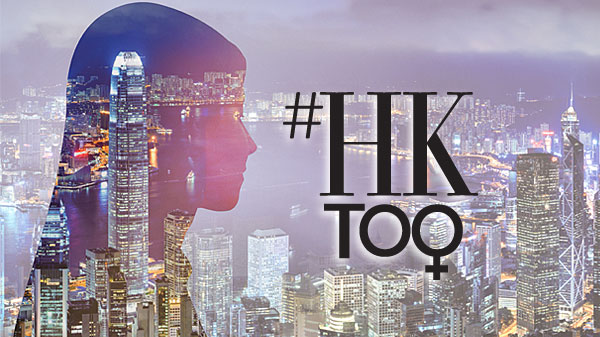
Has the #MeToo phenomenon bypassed Hong Kong or are its women just as empowered as their Western sisters?

Over recent months, an apparent revolution has been going on in the West. It is a revolution that has empowered women to speak out against sexual exploitation and gender bias, triggering legal action, boycotts, film reshoots and the ostracism of some of the most powerful men in the fields of entertainment, politics, technology and academia.
While the women of the West have been vocal in their calls for a new deal, the women of Asia have remained remarkably quiet. There have only been a few marches in Tokyo, Bangkok and Hong Kong calling for an end to the kind of patriarchal practices that have exploited and undermined women for countless generations.
Is this because the woman of the East already enjoy a level of emancipation their Western sisters can only dream of? Or – more likely – is it because the oppression of women in Asia is so endemic that few have the courage to speak out against it?
With sensibilities awoken across the West and many women feeling empowered to speak for the first time, a movement was born. This, in turn, spawned the #MeToo hashtag, creating an online platform for women to share their experiences and offer their support.
While the subject has dominated the broadcast media, newspaper columns, dinner table conversations and watercooler encounters across the West over the last six months, it doesn’t seem to have had the same resonance in Asia, in general, and in Hong Kong, in particular. At least, not on the surface.

One person better placed to judge this than most is Fiona Nott, Chief Executive of The Women’s Foundation, a non-profit organisation dedicated to improving the lot of women at every level of Hong Kong society. Gauging the local impact of the mass mobilisation of women across the West, she says: “Since the #MeToo movement erupted, and, in particular, since Vera Lui [a Hong Kong hurdling champion] revealed her own experience of abuse in November last year, the number of complaints coming in from victims of sexual assault has doubled.
“For my part, I see the #MeToo movement as being about more than just any individual’s experience. It’s a wider issue related to women’s equality and we believe that one of the solutions is to have genuinely equal rights for women, with more women in leadership positions.”
Nott’s view that the problem is endemic and partly economic in nature is certainly borne out by the statistics. Perhaps surprisingly, given its status as a global financial centre, Hong Kong women are worse off than those in most other developed economies. With an average gender pay gap of 22 percent, Hong Kong has got ten worse instead of better over the last ten years. Back in 2007, the comparative figure was just 19.1 percent. The new figure sees it well behind the UK (9.1 percent), Australia (15.3 percent) and Singapore(19 percent). Similarly, Hong Kong women are less likely to secure board appointments than their counterparts elsewhere in the world. While women only account for 13.8 percent of the boards of Hong Kong’s biggest businesses, the comparable figure in the UK is 26 percent, while Australia weighs in at 25.4 percent. It still outperforms Singapore, however, where only 12.2 percent of board members are women.

One area where Asia is very similar to the West with regard to the issues raised by the #MeToo campaign is the reaction of local men. Mostly everywhere, the male of the species has kept a low profile, offering little in terms of comment or support.
A rare exception to this is Benjamin Law, an Australian journalist. Writing on Twitter, he pricked the conscience of many by saying: “Guys it’s our turn. After yesterday’s endless #MeToo stories of women being assaulted and harassed, today we say #HowWillIChange.”
Sadly, his initiative failed to catch the attention of the mainstream media, but thankfully his is not a lone male voice. More locally, the call has been taken up by Sanjeev Chathrath, Co-Chair of Male Allies, a group of male business leaders committed to promoting gender equality within Hong Kong. Outlining the aims of the group, he says: “All of our members have made personal and professional pledges to help advance gender balance. These pledges range from personal behaviour, to making visible commitments, and making institutional and policy changes designed to promote, support and celebrate diversity.”
As a sign that Hong Kong may at last be ready for such an initiative, last year it elected Carrie Lam as its first female Chief Executive. Korean legislators have taken action against those who would exploit their personal power to coerce sexual favours from their subordinates, raising the maximum sentence for such an offence from five years to ten. But Asia is still lagging behind the West, where the maximum sentence for such an offence in many jurisdictions is now life imprisonment. With statistics showing that one in seven Hong Kong women has experienced some form of sexual assault (and 90 percent of these are never even reported), it is clear that this is every bit an issue here as it is in the West.
The full version of this feature appears on Gafencu Magazine’s June 2018 print issue as “#HKToo” by Hira Desai. You can download the free app for digital editions of the magazine.







